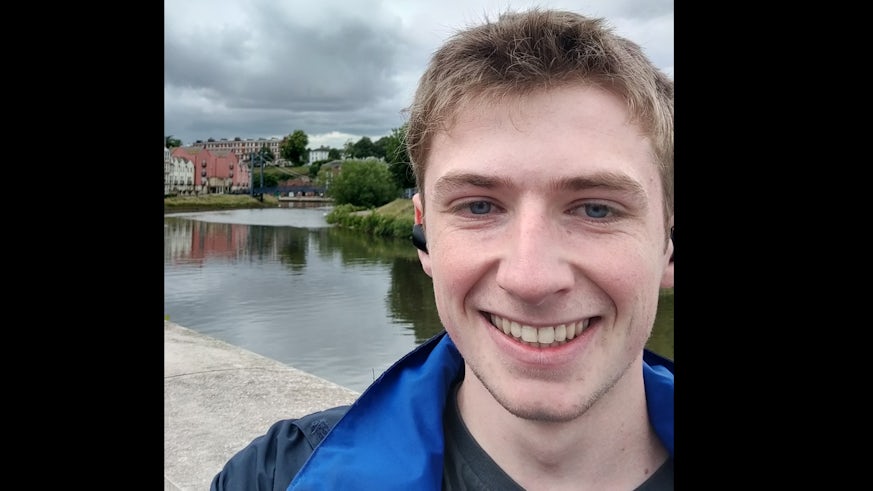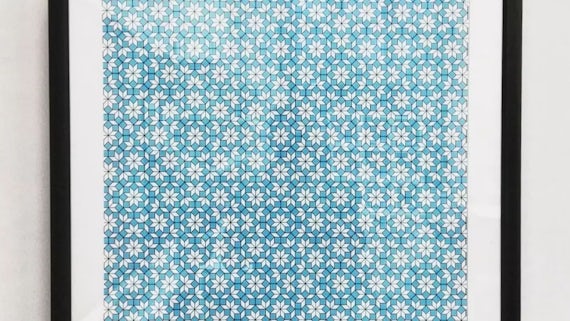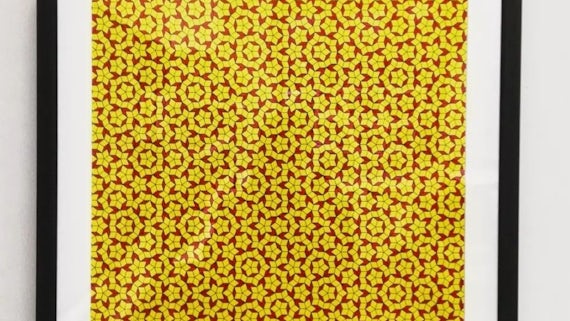Graduation celebrations for ‘exceptional’ physics student
21 July 2022

Josh Colclough will graduate from the School of Physics and Astronomy this year having far exceeded all expectations.
Josh’s undergraduate research project went above and beyond the level expected of him, gathering praise from leading academics across the UK and inspiring the creation of a piece of art.
Under the supervision of Dr Felix Flicker, Josh’s ground-breaking work was awarded the School’s Prize for Outstanding Physics Project, demonstrating excellence in all assessed areas and generating significant and demonstrable impact beyond the School.
Josh’s project culminated in the creation of a piece of computer code that can now be used to design 3D quasicrystals.
Whereas most crystals are composed of a three-dimensional arrangement of atoms that repeat in an orderly pattern, quasicrystals behave differently. They have an orderly pattern, but that pattern never repeats itself exactly.
Quasicrystals have unique electronic, optical, and mechanical properties and have therefore been used in a number of novel and interesting applications, from non-stick frying pans to surgical needles and razor blades.
Josh describes his code as a ‘bathroom tile generator’ which not only lays out the tiles in a flat structure on the floor, but also in any direction and dimension that you like.
“The novelty lies in the fact that it can be used to make an infinite number of different structures, in different spatial dimensions, all with the same method. In the past code to generate 3D non-repeating structures had to be made individually,” Josh explains.
Dr Sam Ladak, from the School of Physics and Astronomy, said: “To date it has only been possible to easily design 2D quasicrystal systems, mainly because the creation of the more complex 3D counterparts was lacking in the literature. Josh’s work effectively solves this problem.
“Such work will be internationally unique and preliminary results will also be used in future EPSRC grants upon the topic.”
Professor Ronan McGrath, of the Department of Physics at the University of Liverpool, said the standard and depth of Josh’s work was “exceptional for an undergraduate project”.
Josh says that his research could be particularly useful in the design and creation of catalysts, which are used by a number of industries to speed up chemical reactions.
“Scientists can now easily generate any structure they would like, and then use that in their model of the design of a catalyst to see how the catalyst may perform,” Josh explains.
“Catalysts are a huge part of the world economy, and so improving these catalysts would have a ripple effect in terms of improving major industrial processes, food production, and reducing pollutants.”
Taking the project one step further, Josh shared his computer code with Liam Taylor-West, an artist-in-resident in the School of Mathematics at the University of Bristol.
Liam used the code to create two specific high-resolution tilings that featured in an art exhibition that ran at the end of January 2022 at the University of Bristol and were displayed at a special event hosted by the Open University to honour Uwe Grimm, one of the early pioneers of aperiodic tilings.
Liam explained that the artwork drew “lots of positive attention” including “some offers to purchase them”.
Josh will be one of thousands of graduates this week who will have benefited from Cardiff University’s research-driven approach to teaching and learning.
Studying in a research-rich environment means students are taught by scholars working at the frontiers of knowledge in their disciplines and enables them to develop critical thinking skills and prepare students for bright and successful futures.
Dr Richard Lewis, Director of Teaching and Learning within the School of Physics and Astronomy, said: “I am always delighted to see students at the School of Physics and Astronomy excel in their research projects. Josh’s achievements are truly exceptional and entirely deserving of this recognition.
“He clearly has a bright career ahead of him and I wish him all the best of luck for the future.”
Josh has recently taken up a role at the Met Office in Exeter as a Foundation Scientific Software Engineer in data assimilation, where he works on computer code to update weather models with fresh data from observations.
“My project with Dr Felix Flicker was a great experience. I was grateful to be able to work directly with people doing the latest research in metamaterials from within Cardiff University and the University of Liverpool,” says Josh.
“The project was definitely the highlight of my studies at Cardiff.”







